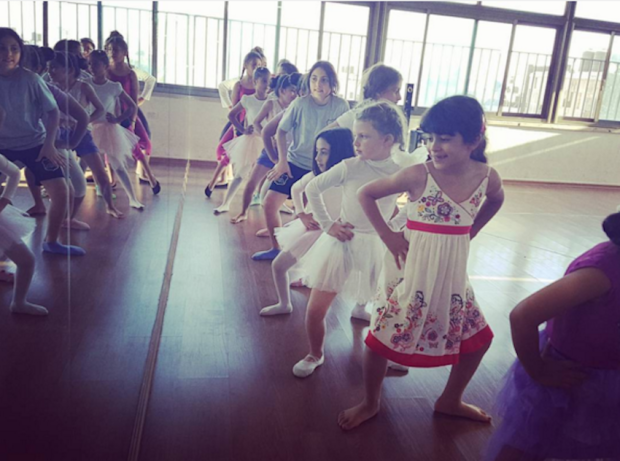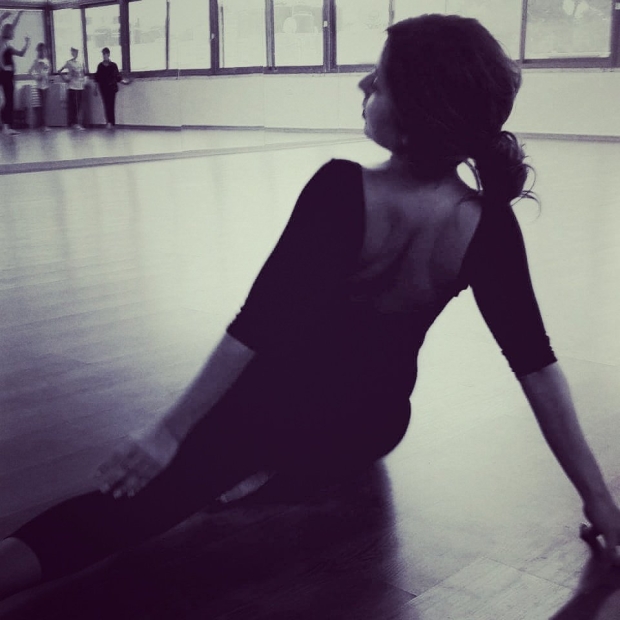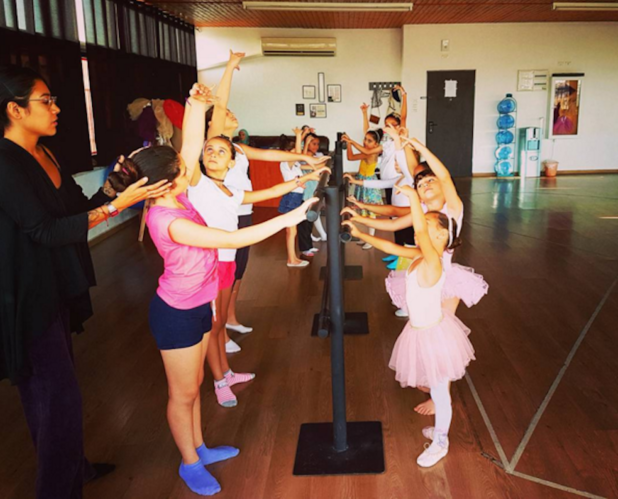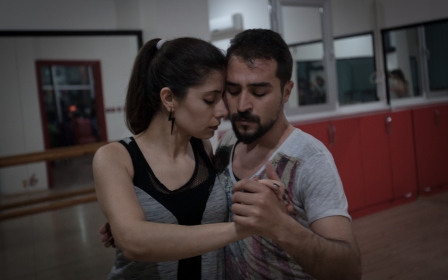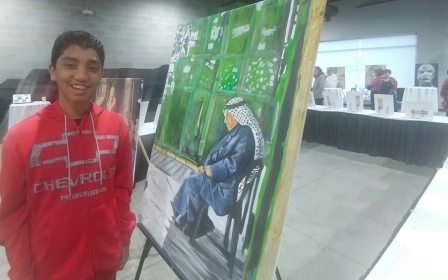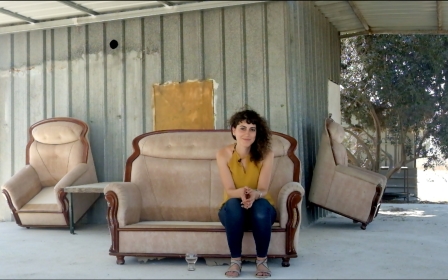Twirling through occupation: The tale of a Palestinian ballet studio
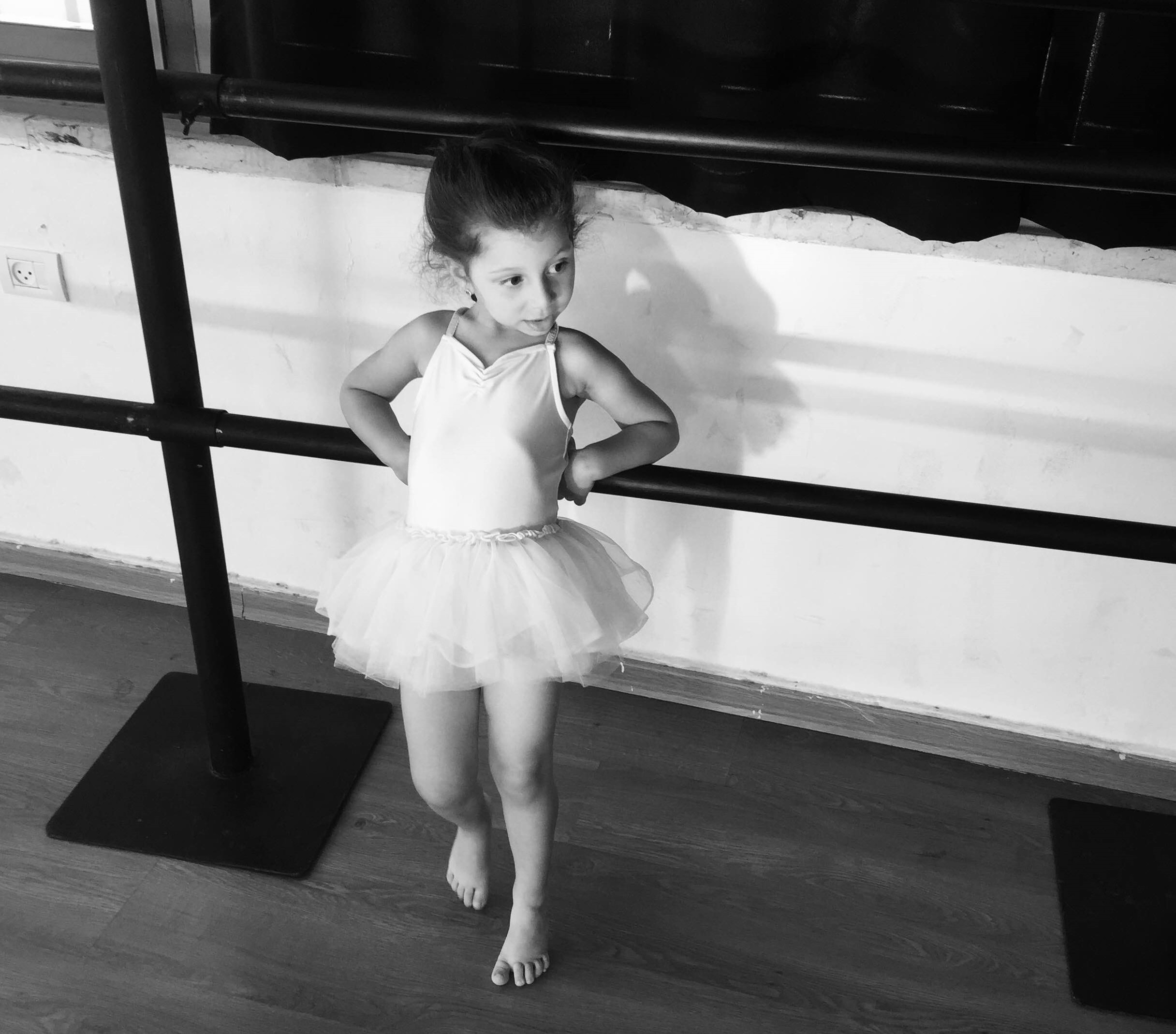
RAMALLAH, West Bank - “Demi-plié. The dance instructor’s voice rang out in the studio, and the 10 little girls, some dressed in tutus, others in tights and t-shirts, obeyed by bending their knees with their heels touching. “And again. Good!”
As the late afternoon sunlight filtered through the windows of the Ramallah Ballet Centre, located on the top floor of a stone building in the old city of Ramallah - commonly known as Ramallah al-Tahta - the class came to an end.
The girls flitted toward their waiting mothers, as Shyrine Ziadeh, the centre’s 28-year-old founder and CEO, watched on before joining the small crowd to chat with her students and their parents.
As the studio emptied, she sat down next to the front desk, looking through her phone at the images and short clips she had captured from the class.
“Even if I started this school five years ago, I still feel like I am at the beginning,” she said, not without a sense of astonishment.
A space for self-expression and creativity
Ziadeh established the centre, the first of its kind, after she graduated from Birzeit University with a business degree. Although she is not professionally trained in ballet, she has been dancing since she was six years old, developing her skills at a young age in workshops and after-school classes.
Although Ziadeh wanted to use the studio for classical ballet classes, the centre’s trajectory slightly deviated due to the lack of sustainable instructors and demand for more dance genres.
“I started with 10 kids and thought I could do this for only one year, but then more and more people showed an interest,” she explained. “What we need in Palestine is a free space to dance, to feel free, to express our feelings. That’s why I decided to change the direction of the centre, and just give the kids a space to dance, to jump, to express their creativity.”
Ziadeh had originally set up a programme, where any dance teacher, mostly foreign, could come and give classes on their own style of dancing for three months, from hip hop to salsa, catering to both children and adults.
Another programme enabled teachers from Estonia to come to Ramallah and, in exchange for free accommodation, give lessons for three months at a time, or for the duration of their visa.
However, Ziadeh stopped the programme last year because she felt it was not sustainable and the students were not progressing.
“The teachers can still come, but it’s not stable in the long run for the kids. Once they start to feel like they got used to the teacher, she ends up leaving because of the visa issue.”
'Back on the ballet track!'
Ziadeh was caught up with running the ballet centre, where she played the roles of accountant, promoter, organiser, coordinator and teacher.
“In the summer there are free-range dance classes, but now I want the students to learn discipline,” she said. “I don’t want the kids to feel like dance can only be a hobby; they can also make careers out of it if they want to.”
What the centre needed was a reliable ballet instructor who was able to teach on a consistent basis, to fulfil Ziadeh’s original purpose of giving classical ballet lessons not just as a means of creative expression, but for the students’ progress and development through dance.
In that sense, the arrival of Yuki Mendez was a blessing.
Mendez, who along with her husband moved from the United States to Ramallah in the summer, managed to secure a one-year visa thanks to her husband’s teaching job at the Al-Quds Open University in the West Bank town of Abu Dis.
For the first time since the centre’s establishment, this has enabled classes to run four times a week for two groups of young girls – one group for those under seven and another for those up to the age of 12 – in tandem with the September-May school year.
“We’re finally back on the ballet track,” smiled Ziadeh.
Mendez is focused on teaching discipline to her students, and has a strong background in ballet. The 26-year-old began dancing at the Shimada Ballet Institute in Japan when she was five years old, before continuing at the Dance Institute in Austin, Texas. At the age of 12, she moved to Sao Paulo in Brazil to stay with her grandmother, and was introduced to the modern Japanese Butoh dance form.
Shifting attitudes, community acceptance
Ziadeh still attends classes to ease the language barrier between Mendez and the students, and sometimes joins in, but overall she now has time to run the centre efficiently, which relies completely on the fees paid by the students’ parents. The money covers the rent of the studio, which belongs to the nearby church, and basic salaries.
“We’re not an NGO because we don’t want anyone to support us based on conditions,” Ziadeh said. “This centre is for the public, so I wanted to keep the financial aspect of it pure.”
There were initial reservations about the ballet centre, with some commenting that it is better to teach girls how to pray in mosques, but opinions changed once she explained that dance is not just about movement of the body.
“We already have so many mosques and churches!” she laughed. “I focused more on what dance means in terms of it being good for your health and your body and your mind," she continued, noting that this was crucial, especially regarding the Israeli occupation of the occupied territories.
Closures of checkpoints and temporary sieges of towns and cities in the West Bank by the Israeli army - which have become more common in the past year - have previously prevented adults and children who live outside of Ramallah from accessing the centre for dance lessons.
Yet Ziadeh is committed to running her centre for the long run, and hopes that in the near future, financial support will come from the community itself for the love of maintaining ballet in Palestine.
Ballet across the Palestinian territories
Unlike the traditional folklore dance of dabke, which remains popular and practised informally on social occasions and by dance troupes, ballet is a relatively recent phenomenon for Palestinians. The Ramallah Ballet Centre is the first of its kind in the West Bank, but reports last year revealed a class being taught at the Qattan Centre for the Child in the Gaza Strip by a Ukrainian woman married to a Palestinian.
The classes, among the centre’s various programmes, offered to alleviate the psychological and emotional trauma experienced by children as a result of the Israeli occupation policies. Classes were only for girls under the age of ten, but after a pilot course last summer, have proved to be very popular.
“We started classes again this September,” an employee of the Qattan Centre told Middle East Eye by phone. “There are now 44 students between the ages of 5-9 who attend the weekly classes after school.”
Within the Green Line, Ayman Safieh, a Palestinian citizen of Israel, became the first male Palestinian to be trained in classical ballet. The 25-year-old, who hails from the village of Kafr Yussif in the Galilee, graduated from the Rambert School of Ballet and Contemporary Dance in London in 2012. He has since then gone on to teach ballet at the Al-Amal School for Contemporary Dance in Nazareth, as well as summer courses both on the domestic and international level.
“We want to feel connected internationally,” Ziadeh surmised. We need to send a different message to people who associate only bad images with Palestine.”
“When I travel abroad and tell people what I do, they feel connected to the story because dance is a universal language. Everyone can understand it.”
This article is available in French on Middle East Eye French edition.
New MEE newsletter: Jerusalem Dispatch
Sign up to get the latest insights and analysis on Israel-Palestine, alongside Turkey Unpacked and other MEE newsletters
Middle East Eye delivers independent and unrivalled coverage and analysis of the Middle East, North Africa and beyond. To learn more about republishing this content and the associated fees, please fill out this form. More about MEE can be found here.


